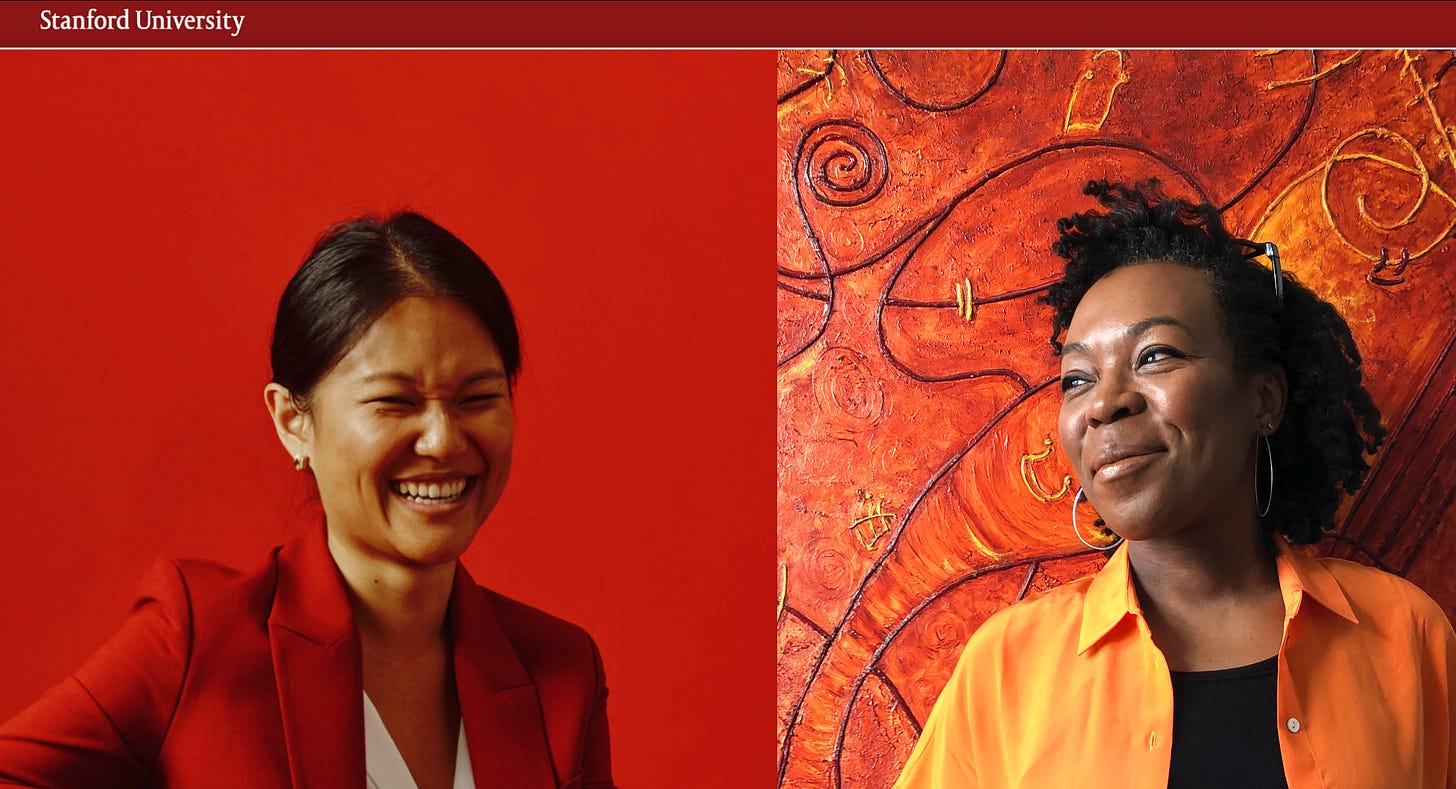This quarter our Ethics and AI students were fortunate to hear an interview and ask questions with Dr. Nakeema Stefflbauer and Karen Hao of the Wall Street Journal, whose articles on AI and colonialism we read in this quarter. Response was overwhelmingly positive, especially for Karen’s thoughtful advice for undergrads joining the global AI workforce, striving to promote greater inclusion, improve working conditions for global data labelers and content moderators, understand China’s AI interests, and effect greater cultural change in Silicon Valley.
After the conversation, Dr. Stefflbauer commented:
“It is rare to speak with journalists who have the technical chops as well as the sensitivity to question the direction of AI –not just in the USA, but also in China and in the Global South. Ms. Hao’s reporting demonstrates how posing questions of fairness, ethics, and moral responsibility help us understand who gets to benefit from AI, who gets to experiment with it, and who gets experimented upon.”
Karen Hao (left) and Dr. Nakeema Stefflbauer (right)
Here are some student responses:
“Dear Ms. Hao, I am so grateful for your talk to our class. I'm a low-income African student, who was so excited to hear about your journalism projects in Kenya and Rwanda. The thing we Africans want Big Tech to know is that we NEED INFRASTRUCTURE first before tech corporations can start building and offering their AI products in African nations. Right now, we see these corps as arriving with products that are popular in the Global North and tech experiments that fail to serve our populations. Why should we agree to give them our data and resources for such technologies that are not only useless to us, but harmful as well. Africans might do well to follow some of Europe’s policy guidelines to protect local populations, but European templates are not one size fits all for African nations’ diverse needs. We also need to bargain for investments on our own terms and have tech corporations understand we will only build technology that includes us and serves us too. As the Europeans have long declared for themselves, we do the same: Nothing about us without us.”
“As a student from South America, I truly appreciate your comments on how Big Tech arrives in developing countries pitching technologies it has not yet tried on North American and European populations but nevertheless wants to test on local populations and gather their data from us like lab animals. This kind of tech incursion is happening now in our countries in so many fields from medicine to education.”
“Thank you, Ms. Hao, for your great many insights. I'm an African student who has long seen how China has been more helpful to us than the US. At home we say, “while the Americans give us a lecture, the Chinese build a hospital.” African nations too want to transform like China did in the early 21st century. We want to keep our own resources, including data to serve our own nations.”
“Dear Ms. Hao, Thank you so much for speaking to us, your work is so important, and we’ve learned so much from your writing. For me, as a Chinese-American with a remarkably similar background to your own family, I too want Americans to understand the widespread belief among Chinese nationals that technology has transformed China’s fate and made their nation a world contender. I’m curious to what extent the Chinese believe this commitment to technology is worth whatever harms algorithms might bring, or whether some members of the general population, especially students, are starting to raise the same questions as we are? Being bilingual in Chinese and English, I find in my research only CCP affirmations of AI and definitions of AI ethics “as whatever serves the CCP.” I know there must be more diverse opinions than these, and see a slightly different conversation in Hong Kong, but also so many, as you say, who benefit from surveillance and want it. Sad to hear the same dynamic is also true in South Africa, where the privileged who benefit from surveillance want more of it.”
“I loved your talk and feel so inspired! Thank you so much! I was especially intrigued with your idea that college students should take control of our job fairs to help tech corporations more clearly hear the message that if they want our skills and ideas, they also need to address algorithmic and corporate harms to marginalized peoples. We are pitching some ideas in our student affinity groups for our next few job fairs and hackathons.”
“A big thanks to Karen Hao, for this galvanizing talk! I wonder how better to prevent a culture of fear in all tech workers so that we here in Silicon Valley and those in the developing world are protected when we organize and unionize. We also see how some of our unions are disempowered here despite a successful organization and we are looking for better security for all tech workers when they organize.”



